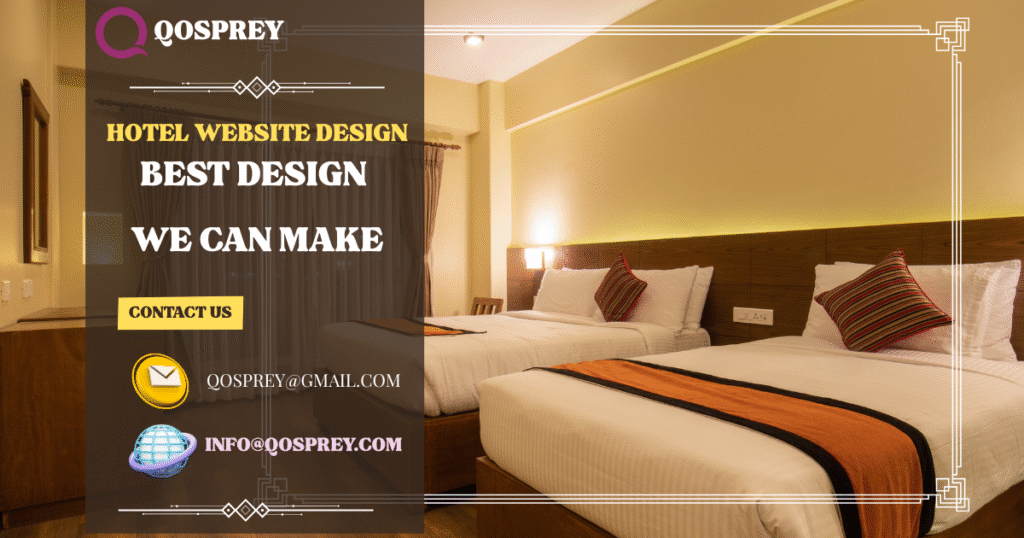Think about the last time you booked a hotel. Chances are, you didn’t just walk in off the street—you probably went online first. That first click, the way the website looked, and how easy it was to use likely shaped your decision to book. This is why hotel website design is so important today. A good site isn’t just nice to look at; it can directly impact whether someone books a room or leaves to check out a competitor.
In this article, we’ll look at why a strong design matters, the key features every hotel website should have, SEO strategies to attract more guests, common mistakes to avoid, and how Qosprey—a global digital solutions company—helps hotels stay ahead.

Why Hotel Website Design Can Make or Break Bookings
Your website is often the first “handshake” between your hotel and potential guests. It’s your chance to create trust and show off what makes your property worth staying at. Studies show that most travelers browse multiple hotel sites before booking. If yours feels outdated, confusing, or untrustworthy, you risk losing them in seconds.
On the flip side, a professional and easy-to-use design helps you:
- Build trust quickly through visuals and reviews.
- Encourage bookings with a smooth process.
- Strengthen your brand so it feels reliable and modern.
- Rank higher on Google with better SEO performance.
A strong design isn’t just about looks—it’s about creating a path from curiosity to confirmed reservation.
Key Features Every Hotel Website Should Include
Not all hotel websites succeed in converting visitors. The ones that do usually share a few core features:
- Responsive design: Your site must work well on phones, tablets, and desktops.
- High-quality visuals: Guests want to see clear, appealing images or even virtual tours.
- Simple menus: Room types, facilities, and booking options should be easy to find.
- Booking system integration: The process should be secure and hassle-free.
- Local details: Maps, attractions, and travel information add real value.
- Language support: Cater to international visitors with multilingual features.
These features may sound simple, but together they create an effortless experience that builds confidence.
Design Elements That Really Matter
Beyond features, the look and feel of your website shapes how guests see your brand. Some essentials include:
- Consistent branding: Fonts, colors, and messaging should match your hotel’s identity.
- Fast booking paths: Guests shouldn’t need more than a few clicks to reserve.
- Clear CTAs: Buttons like “Book Now” or “Check Availability” should be obvious but not overwhelming.
- Trust signals: Guest reviews, awards, and security icons reassure visitors.
- Fast loading: A slow website increases frustration and bounce rates.
Good design isn’t about being flashy—it’s about being clear, consistent, and guest-friendly.
How SEO Boosts Hotel Website Performance
A beautiful website is wasted if no one can find it. That’s why SEO (Search Engine Optimization) is essential. For hotels, SEO ensures your property shows up when travelers search online.
Here are some strategies:
- Keywords: Use terms like “luxury hotel in [city]” or “budget stay near [landmark].”
- On-page SEO: Optimize page titles, meta descriptions, and schema markup.
- Content marketing: Share blogs about local attractions, events, and travel tips.
- Local SEO: Keep your Google Business Profile updated with accurate info.
- Link building: Partner with travel bloggers or tourism boards for credibility.
When SEO is done right, your hotel website doesn’t just attract traffic—it attracts the right traffic, the people ready to book.
Mistakes Hotels Often Make
Many hotel websites fail not because they lack effort, but because of common missteps:
- Outdated designs that reduce trust.
- Long or complicated booking processes.
- Ignoring mobile users.
- Weak SEO, leading to poor search visibility.
- Overloading pages with heavy animations or unnecessary features.
Avoiding these mistakes puts your hotel ahead of many competitors.

How Qosprey Helps Hotels Succeed Online
This is where Qosprey comes in. Founded in 2023, Qosprey is a worldwide digital solutions company with strong roots in Bangladesh. Their 15-member team specializes in building websites that not only look good but also bring real business results.
For hotels, Qosprey offers:
- Custom website design that’s sleek, modern, and guest-friendly.
- Integrated booking systems to make reservations simple.
- SEO and marketing support for better online visibility.
- Affordable packages without cutting corners on quality.
- Future-ready solutions, including SaaS tools for automation and guest engagement.
Their mission says it all: “Make business our headache, not yours.” With Qosprey handling the digital side, hotel owners can focus on creating memorable guest experiences.
Choosing the Right Partner
When looking for someone to design or upgrade your hotel website, consider these points:
- Do they have experience in hospitality websites?
- Can they show real examples of their work?
- Do they understand SEO and digital marketing?
- Will they provide ongoing support after launch?
Agencies like Qosprey are strong candidates because they handle both design and marketing, ensuring your site performs long-term.
Conclusion
Your hotel website is more than just an online presence—it’s a booking engine, a branding tool, and a first impression rolled into one. A well-designed site builds trust, drives conversions, and improves visibility.
With the right partner, like Qosprey, you can create a website that doesn’t just look appealing but also works hard behind the scenes to generate revenue.
👉 Ready to take your hotel website to the next level? Reach out to Qosprey today and let them build a digital experience your guests will love.
FAQs
Common mistakes include outdated designs, complicated booking processes, ignoring mobile users, and neglecting SEO.
Qosprey specializes in creating conversion-focused hotel websites with booking engines, SEO optimization, and digital marketing support.
SEO makes your hotel more visible on Google. With proper keywords, local optimization, and content marketing, you can attract more bookings.
Key features include mobile-friendly design, high-quality visuals, secure booking systems, clear navigation, and local SEO integration.